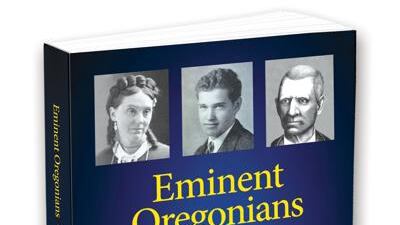Six years before a young John F. Kennedy made a similar trip, a 20-year-old Lincoln High School graduate from Portland boarded an ocean liner for Europe in 1933 to see firsthand what conditions were like for his Jewish relatives in Germany under its new chancellor, Adolf Hitler.
Richard L. “Dickie” Neuberger’s harrowing report of anti-Semitic terror in “The New Germany” was published in The Nation and made the reputation of the aspiring journalist and future U.S. senator, whose writing had already appeared in The Oregonian by the time he was a sophomore at Lincoln. Within a year, he was writing for The New York Times.
Neuberger is one of three largely forgotten figures in Oregon history profiled in Eminent Oregonians (Stephen A. Forrester, 196 pages, $24.85). The other two are early suffragist, newspaper founder and novelist Abigail Scott Duniway and Jesse Applegate, who blazed the Applegate Trail through Southern Oregon, staunchly opposed the extension of slavery to the territory, and stood up for Oregon’s Indigenous peoples before becoming tarnished, perhaps unfairly, for his role in the Modoc War of 1872-73.
Retired Daily Astorian editor and publisher Steve Forrester’s portrait of Neuberger is perhaps the sharpest of the three, offering readers a snapshot of a seminal figure whose life Forrester hopes to expand into a full-length biography. (Disclosure: Forrester was a co-founder of Willamette Week in 1974.)
Neuberger’s narrow election to the U.S. Senate in 1954 gave Democrats control of the upper chamber, making Lyndon Johnson majority leader and paving the way for much of the progressive legislation in Congress in the 1960s if not Johnson’s path to the White House. And like his prescient warnings about Hitler, Neuberger’s environmentalism was ahead of its time. He was an original co-sponsor of the National Wilderness Preservation Act that presaged Rachel Carson’s Silent Spring and the environmental revolution of the 1970s although it wouldn’t pass until four years after Neuberger’s untimely death from cancer in 1960.
Bend author Jane Kirkpatrick’s profile of Abigail Scott Duniway is more an extended tribute than a chronological biography, but there is still much of interest here. Duniway was not only an older sister of longtime Oregonian editor Harvey Scott, she was his rival as one of few women in U.S. history to start her own newspaper. In addition to championing women’s issues in The New Northwest and 22 published novels, Duniway led all but one of six election campaigns to give Oregon women the vote. She finally succeeded in 1912, eight years before the ratification of the 19th Amendment.
Duniway often clashed with national women’s suffrage leaders because she advocated quiet, word-of-mouth campaigns rather than loud parades to convince voters, then all men, to support women’s right to vote, and she opposed linking the cause to Prohibition. She recognized that liquor interests would always resist women’s suffrage if they knew women would use the vote to outlaw alcohol—and she was right. “Still, she stepped on toes,” Kirkpatrick writes. “She didn’t know any other way to walk.”
Jesse Applegate cuts the most tragic figure in Eminent Oregonians, profiled in the book by former Oregonian and Associated Press reporter and editor R. Gregory Nokes. After a son and a nephew drowned in the Columbia River on the Oregon Trail, Applegate resolved to blaze a new trail south of Oregon and back up to the Willamette Valley. The Applegate Trail added 200 miles to the trip and was not without hardship: most notably, a sore lack of water and passage through a canyon whose raging torrent often destroyed wagons and drowned livestock. The angry settlers who’d hired Applegate to lead them were sometimes left with nothing but their lives.
Applegate’s tenure as a provisional legislator and member of the Oregon Constitutional Convention was equally idealistic and troubled. The new constitution banned slavery, as Applegate wished, but it also excluded Black people from settling in the state entirely. Disgusted, Applegate left politics but became caught up in the region’s Indian wars despite his noted respect for Native peoples. Financial reversals led to temporary confinement at an insane asylum and his death, penniless and a widower, in 1888. Despite his sheer cussedness, Applegate was eulogized by even his bitterest enemies as the “Sage of Yoncalla,” his mountain retreat in Douglas County.
What made Applegate, Duniway and Neuberger “eminent” was they knew they had to convince their fellow Oregonians of ideas most did not yet believe—that new states should not perpetuate the sins of the old, that one half of the people mattered as much as the other, and that the new world that emerged from such beliefs would have to sustain life for that world to endure.
STREAM: Eminent Oregonians co-author Steve Forrester discusses the legacy of Richard Neuberger with historian Chet Orloff. Noon Thursday, Nov. 4. Register for the Zoom event at eomediagroup.com/books/eminent_oregonians. Free. The book is on sale now at Chapparral Books, the Oregon Historical Society and the Oregon Jewish Museum.

